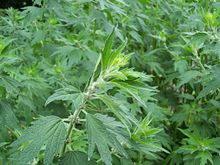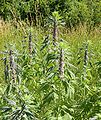- Leonurus cardiaca
-
Leonurus cardiaca 
Scientific classification Kingdom: Plantae (unranked): Angiosperms (unranked): Eudicots (unranked): Asterids Order: Lamiales Family: Lamiaceae Genus: Leonurus Species: L. cardiaca Binomial name Leonurus cardiaca
L.Motherwort (Leonurus cardiaca) is a herbaceous perennial plant in the mint family, Lamiaceae. Other common names include Throw-wort, Lion's Ear, and Lion's Tail. The latter two are also common names for Leonotis leonurus. Originally from Central Asia it is now found worldwide, spread largely due to its use as a herbal remedy.
L. cardiaca has a square stem and opposite leaves. The leaves have serrated margins and are palmately lobed with long petioles; basal leaves are wedge shaped with three points and while the upper leaves are more latticed. Flowers appear in leaf axils on the upper part of the plant and it blooms between June - August. The flowers are small, pink to lilac in colour often with furry lower lips. The plant grows to about 60–100 cm in height. It can be found along roadsides and in vacant fields and other disturbed areas.
Medicinal uses
Motherwort has a long history of use as a herb in traditional medicine in Central Europe, Asia and North America. Like many other plants, it has been used for a variety of ills, and consumed. Midwives use it for a variety of purposes, including uterine tonic and prevention of uterine infection in women, hence the name Motherwort.
The herb contains the alkaloid leonurine,[1] which is a mild vasodilator and has a relaxing effect on smooth muscles. For this reason, it has long been used as a cardiac tonic, nervine, and an emmenagogue. Among other biochemical constituents, it also contains bitter iridoid glycosides, diterpinoids, flavonoids (including rutin and quercetin), tannins, volatile oils, and vitamin A.
Susun Weed recommends it for combating stress and promoting relaxation during pregnancy, also claiming that, given during labor, it prevents hemorrhage. Michael Tierra, on the other hand, contraindicates it for internal use during pregnancy, claiming that it has the tendency to cause bleeding and may induce miscarriage. It was historically used in China to prevent pregnancy and to regulate menstruation. Motherwort is also used to ease stomach gas and cramping, menopausal problems, and insomnia,[citation needed] although Susun Weed warns it may be habit forming if used regularly to combat sleeplessness. According to Tierra, the traditional Chinese medicine energy and flavors are bitter, spicy, and slightly cold, and the systems affected are the pericardium and liver. The fresh or dried leaves (which are called yìmǔcǎo, 益母草) are used, and the recommended dosage is the standard infusion of one ounce herb to one pint boiling water, 2-6 ml of 1 in 5 tincture or 2-4 ml of 1:1 fluid extract, either in 25% ethanol, three times daily.
Yìmǔcǎo enters the Bladder, Heart and Liver meridians in TCM theory. As a blood invigorator, it is currently used to regulate menstruation involving blood stasis, for post partum abdominal pain, for Damp heat skin conditions, and as a diuretic to reduce swelling and oedema.[citation needed]
Gallery
References
- Blanchan, Neltje (2005). Wild Flowers Worth Knowing. Project Gutenberg Literary Archive Foundation.
- Lust, John The Herb Book (1974) New York, New York: Bantam.
- Moore, Michael Medicinal Plants of the Mountain West (1979) Santa Fe, New Mexico: The Museum of New Mexico Press
- Tierra, Michael The Way of Herbs (1980) New York, New York: Pocket Books.
- Weed, Susun S. Wise Woman Herbal for the Childbearing Year (1986) Woodstock, New York.
- Motherwort used as Blood Pressure Tea
Categories:- Lamiaceae
- Flora of Asia
- Medicinal plants
- Entheogens
Wikimedia Foundation. 2010.



